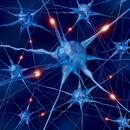Studies have observed an increase in the occurrence of folic acid deficiency in patients with depressive disorder: around one-third of the patients examined demonstrated a lack of folic acid (7). With folic acid deficiency the availability of the neurotransmitter serotonin in the brain is reduced. Moreover, a lack of folic acid and vitamin B12 can lead to a rise in the blood concentration of homocysteine, which has a neurotoxic action (8). Several studies have shown that the occurrence of symptoms of depression is often associated with raised homocysteine concentrations (9). Correspondingly, targeted administration of folic acid achieved a lowering of homocysteine levels and thus reduced the risk of depression. However, at present it is not clear whether an elevated homocysteine concentration is in fact a causal factor in the onset of depression. A review of the usefulness of folic acid therapy in the treatment of depression came to the conclusion that the vitamin could improve treatment outcomes in depression (10). It has repeatedly been shown that the effectiveness of serotonin reuptake inhibitors can be considerably reduced in the presence of folic acid deficiency (11). Hence, treatment with these antidepressants should be accompanied by folic acid supplementation.
Vitamin B12 is involved in the synthesis of several neurotransmitters. In older people, there is a clear association between vitamin B12 concentrations and the risk of depression (12). Deficient or suboptimal concentrations of vitamin B12 are very common among older people, because vitamin B12 absorption is very complex and therefore prone to failure. Vitamin B12 levels should be determined for older patients, in particular, since therapy may bring about a significant improvement in both cognitive performance and mood. Trials have shown that around 30% of patients with depression who were admitted to hospital were suffering from vitamin B12 deficiency (13).
In several cases it was established that depression was accompanied by a deficiency in vitamin B6. Vitamin B6 is one of the most important vitamins for the metabolism of numerous neurotransmitters and is needed for the production of serotonin, norepinephrine, glutamic acid, and GABA. As yet, no study has been able to demonstrate that targeted treatment with vitamin B6 has a significant influence on depression. Only for depressive symptoms associated with pre-menstrual syndrome was it possible to demonstrate positive effects of dietary supplementation with vitamin B6 (14). Together with folic acid and vitamin B12, vitamin B6 is included in standard B vitamin combinations to lower raised homocysteine levels (15).
Vitamins C and E
Mental illnesses such as a major depression are linked to psychological stress that could cause increased oxidation of lipids, hence, a change in the composition of neuronal membranes (16). Antioxidants such as vitamin C (17) and vitamin E (18) could play a role here in protecting against oxidative stress. Raised levels of indices of lipid peroxidation have been found in the blood plasma of patients with depression (19). Moreover, an increased oxidation potential of the erythrocytes has been detected. Patients with depression could therefore have an greater antioxidant requirement. A targeted intake of vitamin C could be of significance for the prevention and treatment of depressive conditions (20).
Vitamin C is also needed for the biosynthesis of neurotransmitters, for example for the conversion of tryptophan to 5-hydroxy-tryptophan or of dopamine to norepinephrine. Another function of vitamin C of relevance for mood and stress management is its involvement in the synthesis of various hormones (neuropeptides and glucocorticoids). Vitamin C also plays an important part in folic acid metabolism, where it is required for activation of the acid.
Vitamin D
Numerous new biochemical functions of vitamin D have been discovered in recent years, meaning that its importance now extends way beyond the maintenance of bone health. Vitamin D is a common and widely useful regulatory molecule. Vitamin D receptors have also been detected in the brain. Hence, a sufficient supply of vitamin D is necessary for the production of stress hormones, for instance. The functions of vitamin D in nerve metabolism have not yet been fully explained (21). In recent years, it has become apparent that vitamin D deficiency is reaching epidemic proportions, especially in northern latitudes and especially in the winter months. Some studies indicate that food supplementation with vitamin D is beneficial for winter depression (22). Vitamin D concentrations are often very low in older people, which can lead to depressed mood and cognitive impairment, in addition to increased risk for osteoporosis and falls (23). There are also indications that targeted consumption of high doses of vitamin D could improve symptoms of depression (24).
Omega-3 fatty acids
The brain has the highest fat content of any organ. The gray cells consist to 50% of polyunsaturated fatty acids, with around 33% belonging to the omega-3 family of fatty acids. While eicosapentaenoic acid (EPA) plays an important role in brain metabolism as a precursor for the icosanoids functioning as immunomo-dulators and neurotransmitters, docosahexaenoic acid (DHA) is an essential structural component of neuronal membranes. In Western industrialized countries, the diet tends to contain a much greater proportion of omega-6 fatty acids than omega-3 fatty acids. This leads to changes (e.g. a decrease in fluidity and communication between neuronal cell membranes) which can be linked to depressive mood disorders. Thus, intakes that are too low and low erythrocyte and plasma concentrations of omega-3 fatty acids correlate with the increased incidence of depression (25).
Administration of omega-3 fatty acids as an adjuvant therapy in combination with antidepressants could be beneficial, especially for people with a dietary deficiency (26). At present the available data indicating an antidepressant effect for EPA seem to be better than data for DHA. But it remains unclear whether dietary supplementation with EPA and/or DHA is generally effective in patients with depressive mood or only in those with unusually low concentrations of these omega-3 fatty acids. In one study, depressive mood symptoms among children could be substantially improved by administration of omega-3 fatty acids in doses of 1 g/day (27).
Minerals
Depressive mood disorders are also among the symptoms of magnesium deficiency (28). Magnesium ions can block specific receptors (NMDA) that appear to be involved in the onset of depression. There are many indications that magnesium could help prevent mental stress (29). Thus, magnesium can reduce secretion of a hormone (ACTH) that is released in greater amounts in response to stress situations.
Trace elements
Selenium has important functions in brain metabolism. Thus, the body maintains the concentration of selenium in the brain even when there is a deficiency in the peripheral organs. A low selenium status has a negative effect on the psyche and can be accompanied by an increased incidence of depression and other psychiatric conditions (30). Furthermore, studies have shown that supplementation with selenium can have a positive effect on psyche and wellbeing, especially in people with low selenium status (31).
In addition to selenium, zinc is an important trace element in brain metabolism: it is needed for neurotrans-mitter receptor activity (GABA and glutamic acid). Like magnesium, zinc can block receptors involved in the onset of depression, which might partially explain its antidepressant activity (32). Zinc also augments production of an important neurotrophic factor (BDNF). It is known that antidepressant substances usually cause an increase in BDNF, which helps improve mood. The verifiably low zinc concentrations in patients with depression could also contribute to their weak immune function (33). Zinc deficiency can often be detected during a depressive episode; moreover, it was demonstrated that the severity of the depression correlates with blood serum zinc concentration (34).
Iron is essential for synthesis of the neurotransmitter dopamine. Iron deficiency can lead to tiredness, impaired cognitive performance, exhaustion and depressive mood conditions (35). In addition, low concentrations of ferritin – a protein needed for the intracellular storage of iron – can lead to symptoms of depression, even before anemia can be detected (36). Conversely, very high concentrations of ferritin can also cause a deterioration in mood.
 In the case of an already existing depression, it appears that targeted consumption of micronutrients may improve symptoms in many instances. In less severe cases, a treatment with micronutrients as monotherapy may be a possibility, but it is more usually used as an adjunct to treatment with medication. The theoretical bases for a micronutrient therapy include a positive influence on
In the case of an already existing depression, it appears that targeted consumption of micronutrients may improve symptoms in many instances. In less severe cases, a treatment with micronutrients as monotherapy may be a possibility, but it is more usually used as an adjunct to treatment with medication. The theoretical bases for a micronutrient therapy include a positive influence on  Depression and nutrition
Depression and nutrition Influence of micronutrients
Influence of micronutrients